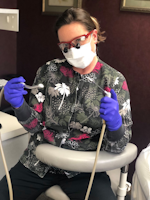Let’s go over the definition of team as provided by the Oxford dictionary. Noun: A group of players forming on a side in a competitive game or sport. We know that our dental teams are not for game or sport, but we do have the common goals to do our best, be our best, and get the best outcome for our patients.
What does being a team member look like?
Being a team member looks like helping the hygienist turn over his or her room when they’re running behind. It looks like helping the other dental assistant in sterilization when the instruments are piling up. It’s helping the front desk call or text to confirm patients for the next day when they’ve been on hold with insurance for hours.
Think of your dentist or practice owner as the coach. If the team does well the team and practice become prosperous. But it’s not just about money; it’s about giving your patients the best care possible. It’s about truly enjoying going to work every day, knowing that you’re never left alone to get things done. It’s almost a given that you won’t like every single coworker that you encounter. However, if you understand the fundamentals of what team means, cohesiveness is a direct result.
What if there is a person on your team who doesn’t play by the rules? You know, that one assistant who always leaves first when you’re still tearing down a room, or that hygienist who never does the dishes. It could even be that front office person who leaves frequently to go to the bathroom to play on their phone while you’re left to answer the phones. This is where I remind you that your team is only as strong as the weakest link.
We’ve identified that one non-team player who is preventing the team from winning. There are lots of strategies to rectify this, such as leading by example, setting and communicating expectations, team building exercises, and finally, when everything has failed to produce the desired results, trimming the fat. As a dental assistant in your practice, you are a valuable voice and should be there to help your dentist see the gaps in the team.
I’ve seen one too many team members leave a practice solely because of one bad apple. Instead of speaking up and offering possible solutions, they just get fed up and take off! Regardless of whether they liked the doctor, the location, the hours, and even the pay, the one team member made the job too miserable.
So, how do you bring up this team imbalance to your doctor or practice owner? Start with a casual chat about an article you read that said instead of complaining, you should take the initiative to find a solution. Make sure you take good notes of the concerns you have with the team member, i.e., specific dates and a play-by-play of things that have happened. Notes ensure that emotion is taken out of the equation. Being vague does not help solve the problem. It’s imperative that you are able to show a pattern of behavior so that you can help with a solution. No matter what, you need to be there for your “coach” in a supportive role. Practice owners have so much on their plates and the last thing you want to do is add to it by complaining.
I’ll leave you with this: don’t let your concerns and grievances get bottled up, never complain behind the scenes, and don’t take any corrective action without going to your coach first. In order for your office to win the game, each player must be at the top of their game.
Ronda Holman found her passion for dental assisting while in the Air Force. She assisted in oral surgery, general dentistry, and ended her four-year service as a prophy tech, the military’s version of a dental hygienist. She believes that every dental assistant has the potential to be a rock star assistant if given the right tools and guidance.






